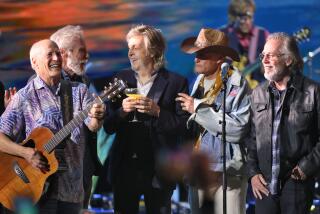JAZZ REVIEW : Hubbard Is ‘One of Kind’ at Barclay
- Share via
IRVINE — A moment after he dedicated his tune “One of a Kind” to the late Miles Davis at the Irvine Barclay Theatre on Friday, trumpeter Freddie Hubbard, instrument silently cocked at his lips, went into a deep, twisted squat, the kind of tortured posture Davis often assumed when he played. But that was the only thing Hubbard did during the number that recalled Miles. From there on, the sound was pure Freddie.
The fact that Hubbard has never copped from his influential colleague’s style--even while working with some of Davis’ sidemen in the ‘60s and ‘70s--says a lot about his character. There isn’t a political candidate out there who can boast that kind of uncorrupted vision, especially under such heavy pressure.
All the quirks and characteristics that have made Hubbard’s music immediately identifiable since his days in Art Blakey’s Jazz Messengers--his singular tone, his full complement of trademark phrases--were on display at the Barclay during the final installment of the Ethnic Jazz Series sponsored there by the Multicultural Arts Council of Orange County. Though his sound has become looser and more roughly edged over the years, Hubbard still plays as if he has something to get off his chest. And that’s exactly what he did.
After solo spots from saxophonist Doug Webb and keyboardist John Beasley (who spent some time in one of Davis’ last bands), Hubbard jumped into the “One Of A Kind” riff with his patented “wee-ow-weeeh!” declaration, then began to rip off long, jagged lines accented with high-end squirts, smears and blabbering two-note phrases. He peaked on a series of high-pitched exclamations before passing on improvisational duties to trombonist Phil Ranelin, whose bluster matched Hubbard’s in intensity.
Actually, Hubbard’s best work was on fluegelhorn, an instrument he turns to with more frequency these days. Unlike any number of trumpeters who have turned to the buttery-toned instrument later in their careers, Hubbard likes to explore the horn’s muscular side as well as its softer nuances--though at times, he matched stinging lines from the fluegel with passages as sweet as honey and just as golden.
His fluegelhorn solo during Thelonious Monk’s “In Walked Bud” opened with a quote from “Surrey With The Fringe On Top” and moved into a long section that Hubbard played with the same strength he brings to the trumpet. “God Bless The Child” featured his most expressive work as he inserted long pauses during the melodic, unaccompanied introduction, pacing back and forth across the stage (maybe the only other thing he did reminiscent of Davis).
The tenor-trombone-trumpet combination made for an especially warm blend of sounds during “The Night Has A Thousand Eyes,” which featured the delicate side of Ranelin’s slide. Pianist Beasley was especially lively throughout the concert, bringing his strong, sometimes angular attack to “God Bless the Child” and prodding Hubbard with unexpectedly-timed accompaniment during “One Of A Kind.” Drummer Carl Burnett provided his usual drive and color, breaking up rhythms just as a soloist was hitting his climax, with startling snare, rim or cymbal shots.
John Leftwich picked up his electric bass for Hubbard’s 20-year-old classic “Red Clay” but seemed tentative during the solo when he tried to emulate the thumb-heavy antics of funk and fusion bassists. Better was his sturdy, inventive upright bass backing of Hubbard’s “Little Sunflower.”
Saxophonist Webb, who last worked with Hubbard some five years ago, seemed least comfortable of the sextet members. His best moments came during “One Of A Kind” when he made understated cries that recalled John Coltrane in pitch if not intensity. He also took a nice turn at the flute during “Little Sunflower,” gracing the pleasant piece with flourishes and childlike scampering around the scales.
More to Read
The biggest entertainment stories
Get our big stories about Hollywood, film, television, music, arts, culture and more right in your inbox as soon as they publish.
You may occasionally receive promotional content from the Los Angeles Times.










